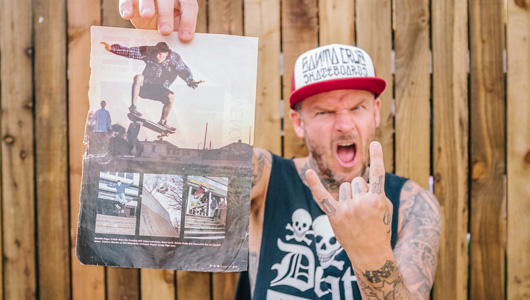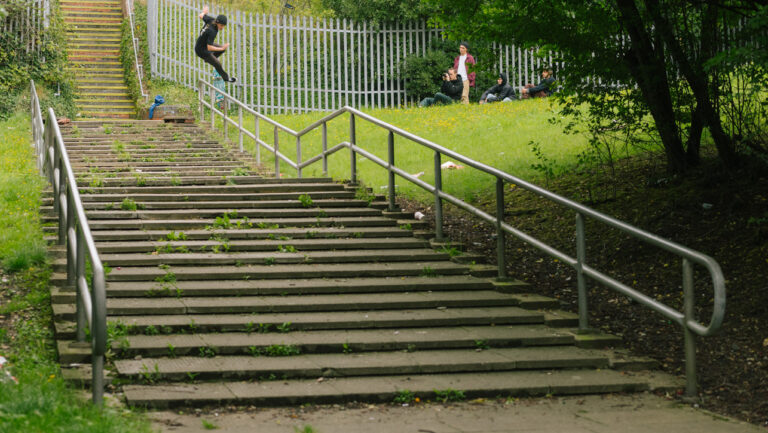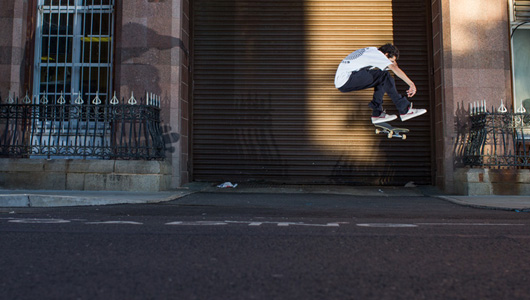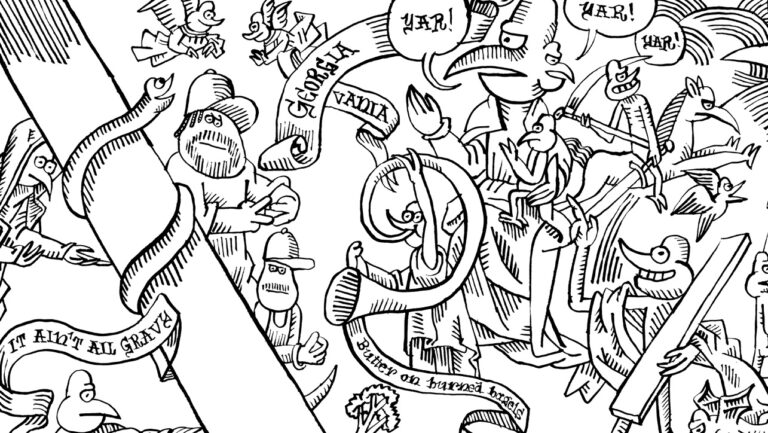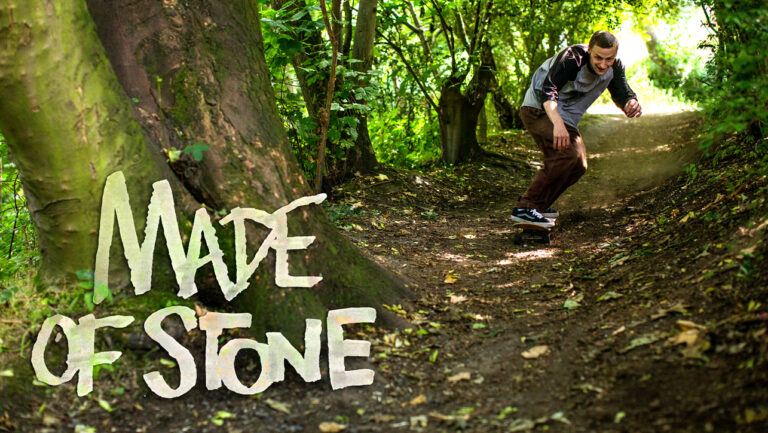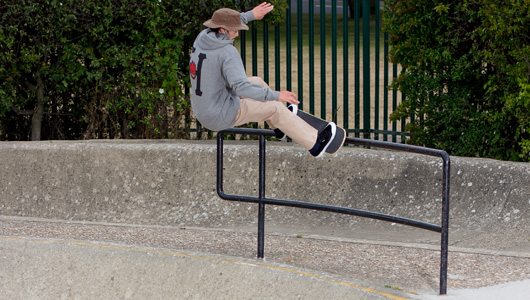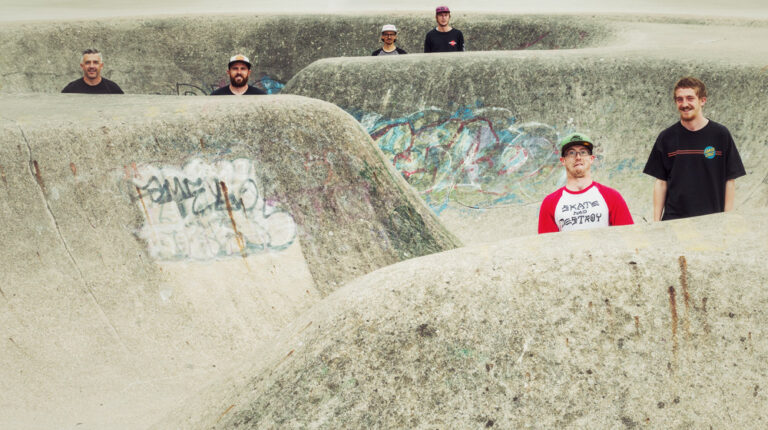Sidewalk 223 – Tommy Guerrero
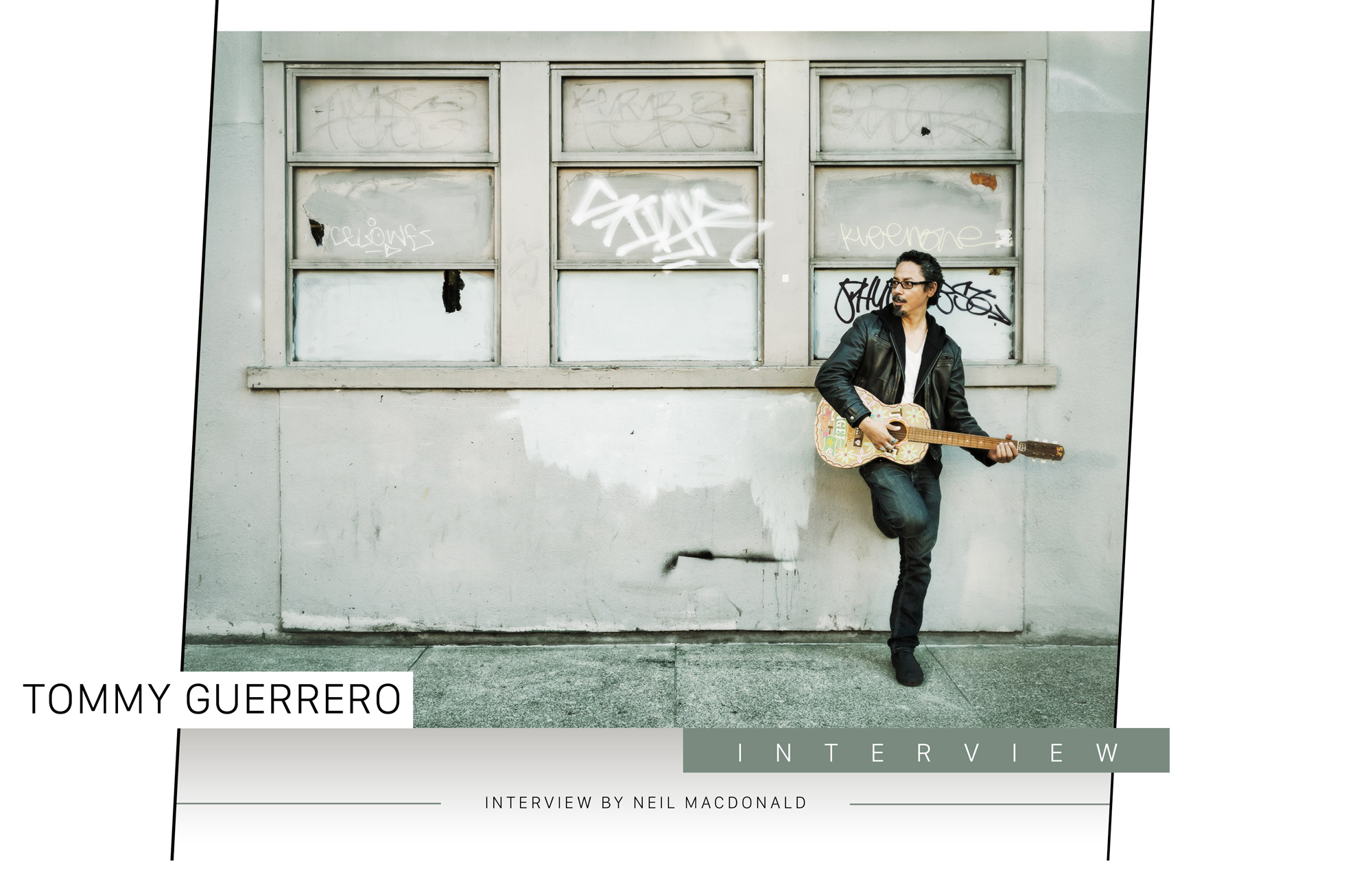
Pioneering San Franciscan street-styler and skate-punk progenitor Tommy Guerrero has been releasing albums as a solo artist for almost twenty years now, and his spacey jazz-rock-blues instrumentals are every bit as flowing, enthralling and fluid as his skateboarding. Since allowing himself more time away from his 'day job' at the DLX distribution house, (in which he has also played a huge part, forming Real Skateboards with Jim Thiebaud), he's been able to spend more time on his music, and is about to release his newest - and finest - album, 'Perpetual'. We spoke to him from SF about music, movement and money.
This new record is out on Grand Palais in Europe, and Too Good in the US, rather than Thomas Campbell’s Galaxia label. What’s Grand Palais, and what happened to Galaxia?
Galaxia has pretty much ceased to exist in the sense that Thomas Campbell has gone off and done his own thing, with Um Yeah Arts, and the other guy at Galaxia, Greg Lamson, he has a full-time job and he has two kids. So it was really just a hobby, and now it’s too much to maintain. I went off on my own a couple of albums ago, with my own label, which is Too Good. I licensed this record to Modulor – Modulor are the distribution company that we’re using in Europe – and Modulor has that label, Grand Palais that they’re working with. I’m not working with them; I’m just working with the distributor, Modulor. The guy who runs Grand Palais just kind of disappeared. He was really hard to get in contact with: very, very difficult. What it really comes down to is that Modulor like what I do, and are down to support it. It’s really cool, because in this day and age, in the music industry, it’s completely upside down. To even sell 500 records now is like a feat, because nobody wants to pay, and it’s all downloads and CDs are pretty much dead. You can’t make a living out of selling records, as a musician. Your hope is just to license music to television, movies, video games etc. Anything really.
The new record sounds pretty different to your past work. It sounds a bit more stripped down, and the playing is different. It kind of makes me think of the way Sam Prekop or Jeff Parker play guitar. Where did this sound come from?
It came from a couple different places. One was not wanting to use the computer to record or edit. You know, to sit around editing waves and staring at a monitor. It came from that, and it came from, well, [previous record] No Man’s Land was pretty heavy, and had a darkness to it, and I’d moved on from that feeling. I really wanted to do something more stripped down, and I recorded the new record, Perpetual, on my eight-track tape machine, which is really fun, and a very different way to go about recording, compared to y’know, ProTools. I just wanted to be much more organic, I wanted it to be much more open, more sparse, and not necessarily write ‘songs’, but just have more of an emotional feel. As far as what I’ve been listening to, it hasn’t been any of the post-rock stuff, but it’s interesting that you say that, since I didn’t hear any of that while I was doing it. I was listening to Ethiopiques, and lot more spiritual jazz kind of stuff, and I’m still really interested in the spatial aspect of spaghetti westerns, and the surf kind of feel, with the big reverb – and open space. It’s interesting to create something with emotional content, rather than just having more layers.
That makes sense to me. The Sub-Saharan folk music and jazz that there is has often got so little to it, such little instrumentation to it, but it’s some of the most incredibly emotional music in the world. Maybe that’s informed by the wide-open spaces too. But going back to your recording techniques – does it bother you that so many people will end up consuming this analogue recording through a digital device?
I definitely think about that. I’m definitely going to do this album on vinyl, but it’s difficult to figure out exactly what vehicle to use for music, and how to get people to support what you do, and actually how to create awareness – that’s the bigger issue. The way I made the record was all very DIY, but I’m not a very good self-promoter. I don’t care for that, but you actually have no choice when you’re an independent artist. I do think about how people are going to consume music, and how they’re going to get it, and if they’re going to get it, and if they do, if they’re actually going to pay for it. It’s really difficult because it really takes so long to create a body of work, to make an album, to put all your blood and sweat into the music that you do, and this creative process, and the outcome. It’s very cathartic, but at the same time it’s a lot of work, a lot of energy – not to mention money. The pragmatic issues: the cost of the equipment, the cost of mixing, the cost of mastering, the cost of the art, the cost of design and layout… All these things cost, and then the actual production of either a CD or a vinyl record, or even just dealing with digital aggregators. And lawyers. And everything else. It just costs money, and you’re twenty thousand into the hole for a small indie record, and you’re just hoping to make that money back.
You’re obviously not a vinyl purist then. That’s good.
If they pay to download it, then great: the problem today is that people are just all about consumption, and they don’t live with things, they just go on to the next thing, because it’s so accessible, and it doesn’t really mean anything. If you win the lottery, and you have all the money in the world, you can get anything you want. Whereas before, there was that struggle, that quest, that journey to get that record or that guitar or that instrument. It took a lot, so once you did get it, you truly appreciated it. When people get free music, they think it just comes out of the ether, into their computer, and they don’t even understand what it takes to actually create that. If they don’t support the artist that created it, there is no music. The artist will no longer be able to make music, and will have to go flip burgers for a living. It really difficult. The sharing of music, the turning people on to it – that’s cool, but I always thought it’d be really cool to have some sort of tip jar. I want to have someone be able to go to my site, and if they dig it, then there’s the tip jar. You can leave me a dollar, whatever you like. There’s gotta be a different way of interacting with your fans – and just people in general. It’s real hard. I’m glad that people get to hear it, but at the end of the day it’s something that’d be nice to be able to live off of.
That’s what Bandcamp do, with the ‘suggested amount’ prices.
I’m on Bandcamp, and I think that’s great that you’re able to do that, but I was thinking more just on the website. If somebody really digs my album, if somebody said, “Hey, check this out”, and they got it for free, then they can just go back, retroactively, to my site and give me five bucks. Or PayPal or whatever.
That seems reasonable. I don’t know if you saw it, but there was a thread on Slap a long time ago about the Ululation [obscure, defunct NYC jazz band whose music sound-tracked much of Stereo’s A Visual Sound] album, and about Seb Carayol trying to organise a reissue through Wax Poetics. I think everything just kind of fell apart, but there was one dude there who had a copy, and eventually he ripped it to digital and posted a link so that people could actually hear it. Do you think this generation have any obligation to archive all the great music that only exists physically? That album might have been lost forever if that one guy didn’t rip his copy.
Hmm. That’s a hard call. Somehow the artist should be part of that process, and also be compensated. I don’t think anyone’s obligated to archive. I don’t think the younger generation are obligated to do anything. The younger generation are just used to getting music for free, and if you try and educate them, it’s difficult, and you’re going to come off sounding as if you’re preaching. You don’t want to do that, but you want to try to just put it out there in a way that is transparent: “It took a lot of money to make this. Just so you know. I’m just trying to recoup, and it’d be great to actually make a bit of money off it.” Without preaching to the younger generation, who just are not aware of what it takes to create something like that.
Who else plays on this record? Is Matt Rodriguez on it? And who did the artwork?
No, it’s just Chuck Treece on drums on, I think, four songs. Maybe five songs. And that’s it. Chris Johanson did the artwork. He’s a local Bay Area artist friend, and was part of the movement that was happening in San Francisco back in the ’90s, with Barry McGee, Margaret Kilgallen and Thomas Campbell, and they knew a lot of the New York scene too; it kind of collided.
How do you think skateboarding’s connection with music has changed? From Thrasher’s Skate Rock cassettes and bands having pro boards, to now? I don’t imagine a kid starting skating today would get to hear as much cool stuff as previous generations did.
Now, there are so many pro skaters in bands. Almost every legit skater plays an instrument now, or is in a band. It’s really cool; it’s come back around fully. Thrasher always does all kinds of Skate Rock events, and works with all kinds of people – like Converse or whoever – when they’re doing the Death Match out in Austin at SXSW. There are so many pros that play an instrument. It’s just another creative outlet, and skaters need that outlet, because a lot of fuckin’ skaters are crazy! They’ve got problems! They need some kind of positive release.
How much does skateboarding inform or inspire your music? Your new album makes me think of those kind of blurry black and white photos of San Francisco that Transworld and Slap used to run in the ’90s. This cool, poetic, stylish, artistic vision of things. That shaped SF in my head when I was a kid – a Tobin photo of somebody standing at a bus stop in the rain could even do that, it could look that cool. There’s something so deeply San Franciscan about your music, beyond the fact that it’s you making it.
I think my environment informed me. Where I grew up in San Francisco, growing up in the hills, that was definitely part of my evolution, and the way I learned to skate. Because you’re surrounded by hills, so you’re gonna go down the hill. It really nurtured a different approach, and a different way of skating than a lot of what was going on at the time, or even before that, because I’ve been skating since the mid ’70s. So we weren’t skating backyard pools, we were skating street, we were skating the hills. I think that maybe, over the years, it’s affected the way I like to skate. It’s lines; it’s continual motion and movement. From growing up on hills, that sort of informs you. With music, I always wanted it to be really fluid. I don’t want it to sound fragmented, I want to be super rhythmic, and just fluid. Just very natural and organic. I approach skating that same way. Tricks, yeah, but I appreciate fluidity and grace and simplicity and power with skating more so than somebody who can do some technical trick on a ledge. It’s a different approach. With music, maybe that informed me. I really don’t know, to be honest.
Powell recently reissued all their best old boards. How have sales of the Flaming Dagger reissue deck compared with the original?
I’m super grateful that they did that. As far as actual numbers, it’s probably about an eighth of what we were selling back then? Maybe even less. But we’re making more. Like, back then it was basically a buck a board, which was not much, but now we get more per board, royalty-wise. It’s cool, and I think a lot of people are stoked to be able to relive that era of their lives. That was a special time for a lot of older dudes, who’ve gone on to just have jobs and have families and so forth, and given up skating. That was the era in their life, with their friends, their crew, when you’d go out and skate every day. Those memories from that time can never be duplicated. It was a really sweet era, and really precious to a lot of people. I get emails all the time from people saying what an influence that era had on their lives, and how it still resonates with them today, and so they’re stoked to be able to pick up those reissues today. That’s what’s rad about them. At first I wasn’t sure I wanted them made, for different reasons, but now that I’ve seen the response and how stoked people are, that’s cool.
There was an interview with Tony Hawk recently, where he talks about when vert died, and street started getting big. That was round about the time you left to start Real, and you were the first dude to leave Powell, so was there any animosity from those guys?
Not from the riders. Stacy and I left on amicable terms, but when I saw him at a contest for the first time after I quit Powell he was not so cool. I was surprised because Stacy’s always such a sweet guy. I just think he took it personally. He was more like a big brother than he was a team manager. He was kind of the leader. He definitely was a big influence on all of us. Still to this day he is! I think it was hard for him too, but it was hard for me to leave for all kinds of reasons.
Was it scary going from Powell to DLX? They were only distributing records and Thunder trucks at that time.
It had just been taken over by Jeff Klindt, and I knew B. Ware, the guy who ran DLX. He put out McRad records, and the Faction records, and a bunch of other stuff. I knew him from way back, him and Fausto [Vitello] from before Fausto started Thrasher, when I was really young. Once Jeff Klindt took over they were doing Spitfire and Thunder. Spitfire’s been around for a long time, but there were no board companies or anything else, it was really small. There were four people, in a very small office space with a very small warehouse. I think our first shipment of boards was 300 boards, total. And we sold those to make money to buy more. It was nothing, it was in the red and they owed money, because it wasn’t being run properly. When we came along, me and Jim [Thiebaud] – and the rest of the crew, of course – it just kind of kicked off, because of what Jim and I personally had done with skating. It gave the company validity, and cred, right out of the gate. That’s how DLX benefited from us coming aboard. That was a big part of it.
You were involved with Powell, and then Real and DLX, and then Mo’ Wax, all at the times when these companies were making their pivotal moves. Were you aware of any of this at the time? Are you aware when you look back?
I can look back and see, yeah, but when you’re in the moment, you’re just in it. You’re not thinking about the fact that you’re changing anything in the historical sense, or within the skate world or community. You’re just thinking about how you survive, how we can keep going, how we can make this work. So we would just hit the road, just like we used to. Hop in the van, and just go spread the word, right? Just go do demos whenever we can. We were the ones who’d go do demos in winter, and people thought we were crazy. We’d also invite all the skaters, from the shop or whatever, to come skate with us at the demo, because at that point we didn’t want to be on a pedestal, some dog and pony show, as though we were there to entertain. We wanted just to go and skate, and hang with the locals, the skaters, the shop, the owners, and just shoot the shit before we head on to the next. We kind of changed it up, because at that time demos were like you’d show up, everything’s cordoned off, you do your thing for an hour or however long, and then you sign and then you split. We had a different approach, intentionally.
There was a DLX art exhibition recently. Is that something you’d like to explore further? There are a lot of people putting out books now, what about a Krooked one?
We haven’t done anything brand-specific. Krooked makes sense, to have the original art that went on the boards, or something like that. It’s just that it actually takes quite a bit. What I would love to see is really like more of a DLX book, a photo book of DLX over the years. Gabe Morford has so many photos; it’s out of control, so many great photos. That would be cool. We’ve been talking about it for years, but to try and make it happen is a whole other deal.
A Morford DLX book would be wicked. What does your regular day at DLX involve? Is it even regular?
My days at DLX are not regular at all. For a long time I was actively involved in the physical layout of the boards, and of the ads and everything, and then it started to actually have a physical effect on me. Repetitive stress disorder, carpal tunnel, all of that: I made the conscious decision that I’m not on this Earth to colour boards, basically. Working with Mark’s art, I just didn’t feel that I wanted to damage myself, and – in the process – make it more difficult to play. I think if there’s any reason I’m here, other than my son, it’s probably music. Long story short is that I’m just art directing Krooked now. We have a crew of artists that work there who are way better than I am, way faster, and better. It just made total sense to pass that on, so now I’m not doing all that work.
Talking about the manufacture of skateboards, I’ve wondered this since I was a kid: Powell boards were always more expensive, but they always seemed to delam easier. Word was that it was because they didn’t have a coloured middle ply. Is there any sense in that?
I haven’t heard any of that. I think one of the reasons why they were more expensive was probably because they had their own plant, on location. Woodworking, wheel making, everything at Powell. It’s costly obviously in that way, but also I think because of the art, you know? [Vernon] Courtland Johnson is such an incredible artist, and I think some of the stuff Powell was doing was definitely a bit better quality, but I don’t know personally why the boards were more expensive. Maybe just because George wanted then to be! Haha!
How much would it cost to clear the rights to one of your tracks for a skate video?
It just depends. I’ve let people use them for free. If some people have a little bit of money, I can work with them, within the skate community. It’s just really about lawyers. A lot of the time if I give a track gratis, then I have my lawyer deal with it, just as far as the legality of it is right, fair usage… He wants me to do everything his way, but a lot of shit goes under the radar. Don’t tell him. Sometimes he finds out and gets pissed. I’ve let people use stuff for free, but it costs me to have my lawyer draw up a paper and so forth. Ha! It just depends. It depends on the company, because we have three board companies, and a lot of my music’s in Thomas Campbell’s films, and so I really try to limit who I give stuff to, so it actually still has some meaning and I’m not just over-saturating our community with it. What I want to do, in the very near future, is that I want to reach out to the entire skate community and I want to create something that is like a library of music. Like, put me on a retainer or somebody can say “Hey Tommy, can we get some music for our content? Here’s whatever the budget is”, and I’ll make music specifically for them, x-amount for the year. Something like that would be cool, you know? I think there’s a place for that because the skate community just steals everything, so nowadays with YouTube, and all the channels, they pull stuff down immediately. It makes sense to try to get something customised and legal, and something cool and unique, rather than just stealing somebody’s song and hoping YouTube doesn’t pull it down.
Oliver Barton said in his recent North interview that Riley Hawk had wanted Pink Floyd for his TWS part, and the agency just said that if it’s less than $100,000, they don’t even bother asking Pink Floyd. But then Bowie’s known to be into it, and he’s cool about it, but it makes me think that the future might all be specifically composed music.
I think it’s cool that a big artist does that, because one thing about somebody like Bowie, he’s not relevant with young people. He knows that that’s an avenue that he can get in, and it’s a vehicle for him to get his old stuff out there to a whole new audience. But at the same time, he’s made his money. Like, why would he need another $500? Or another $5,000? What would it matter? It’s like all those big bands, like Metallica or whatever, suing Napster and suing people for using their music. It’s like, you guys are mega rich – you go out and spend half a million dollars on a birthday party! If this guy is living hand-to-mouth, you should pay him a hundred bucks or whatever it is to use the song, and if this other guy lives high up on the hill in a castle and drinks liquid gold, then he probably doesn’t need your $500. So it works both ways.
Totally. Alright, what are your plans for the year? How can people in Europe get hold of the new album?
That’s a good question, how they can get a hold of it. I don’t know! Ha. Modulor Distribution I hope will take care of that, and get the record out there. I don’t know if there’s record stores anywhere, I mean there’s very few here, you know, in the States. I have my Bandcamp page, and all my music’s up on there except for the two Mo’ Wax albums, I’m just waiting with those, I want to do vinyl of those because I now own my entire catalogue, which is cool. But yeah, it’s out there! I have my website, that I’m trying to revamp because I don’t really interact with it, but the best way to find out is social media. It’ll be up on Facebook, and I put it up on Instagram and all that crap. If you actually want to go buy it, most of it is on iTunes. But I’d just go to Bandcamp. They do better deals for artists. I know one of the guys there, he used to work for [record label] Ubiquity for a very long time. He’s English, Andy Jervis, and he used to be a heavy DJ way back. He’s just a really cool dude. So they’ve been there, and what they’re trying to do is cool. It’s much better than any of the other vehicles out there, or any of the streaming services out there. I mean, they don’t pay anything. Nothin’. So it’s almost worth trying to get your stuff taken off Spotify or anything like that. People say that people find out about your music that way, so that’s cool, but then I had dialogue on Twitter with a handful of people and I was putting it out there, “When you find music on Spotify do you go out and buy the music or do you just stream it?” and lot of them admitted “Yeah, I don’t buy it, I just stream it”, so there you go. For a million plays on Spotify you might make $1,100.
And that’s if you’ve even signed the right digital licensing agreement with your major label. If you’re just a dude with some songs you’ll probably make nothing. You’re not valued.
Yeah. It’s hard. I don’t know how to approach it. Hopefully I can just keep playing. I’m going to have a little record release tour, just going down south, going down to LA. I’m gonna fly Chuck Treece out here, from Philly, and get a van, and then hotels, and it’s just all very costly when I don’t have label support. I’d love to come back to Europe and play, and people are talking about trying to make it happen. I would like to maybe do the festival circuit, because you don’t have to rent gear or anything, but again it’s just money. Flights, all that shit. It’s just money.
Always.
Always! It’s hard.
Perpetual is released physically and digitally on October 25th

